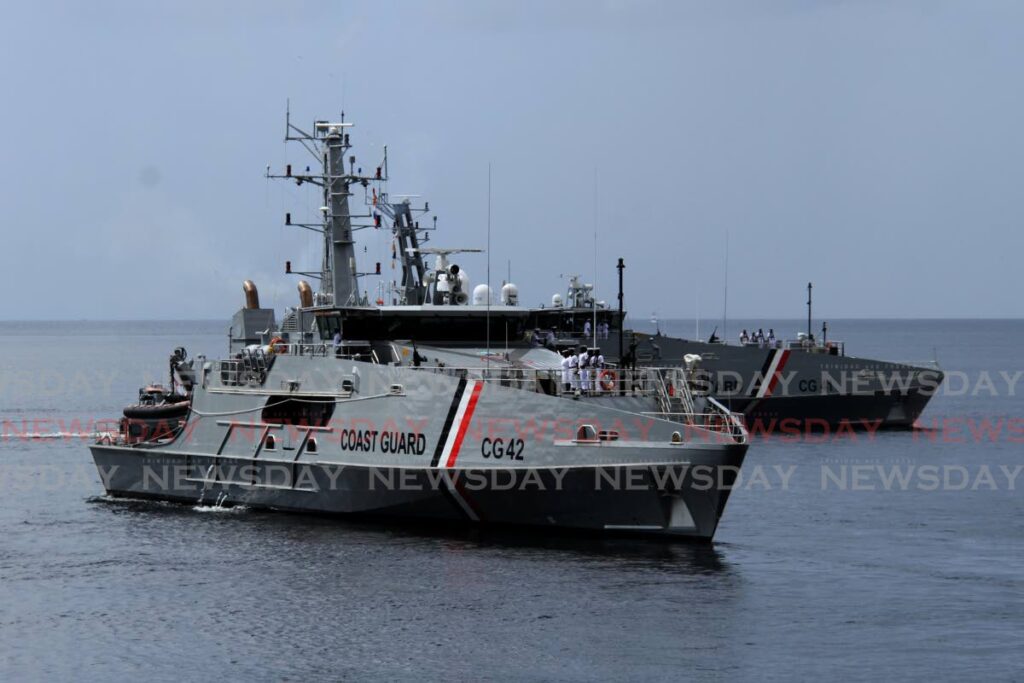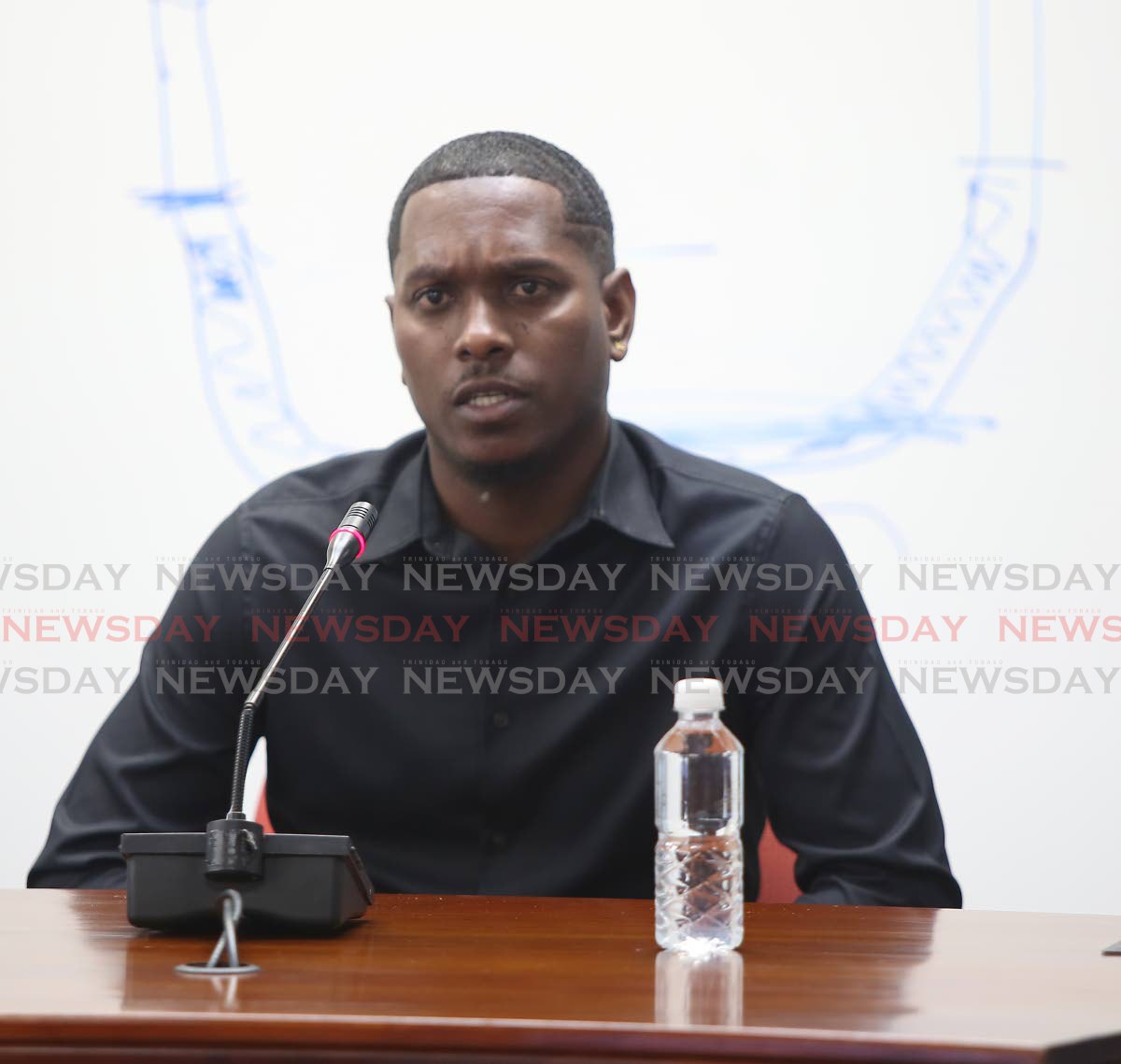[UPDATED] Coast guardsman: We never stopped rescue divers in Paria tragedy

LEADING seaman Andre Leidgewood has said the Coast Guard never prevented any rescue divers from entering the water to try to save divers who were sucked into a 30-inch undersea pipeline at Pointe-a-Pierre on February 25, nor were they instructed to by Paria Fuel Trading Co Ltd.
He was speaking at the Commission of Enquiry (CoE) into the tragedy at Tower D of the Port of Spain International Waterfront Centre on Monday.
Last week, LMCS dive operator Andrew Farah testified to the enquiry that members of the Coast Guard told them not to enter the pipeline when they were about to put their rescue plan into action.
In addition, he said the Coast Guard members said they themselves could not take over the rescue, because they were not trained to enter pipelines.
Leidgewood, a member of the Coast Guard for 16 years, had a different recollection of events.
He said he first got a call around 4 pm saying some divers "went underwater and didn't come back up" at Paria's facility.
He said it took approximately 45-50 minutes to get there with his five team members – only one of whom was a diver – as he was onshore at the time he was alerted.
When he got there, he said, he was shocked to learn the divers in question were stuck in a pipeline. He had not been given this information before he arrived.
He told those present he was not a diver, and that the Coast Guard diver was not trained to enter pipelines after Paria asked for the Coast Guard to take over the operation.
He then returned to base with his previous team to get a new team of ten divers and two other crew members.
Asked by the CoE's lead counsel Ramesh Lawrence Maharaj, SC, whether the Coast Guard prevented anyone from diving, he said, "I can't recall that at all. No one from the Coast Guard (did that)."
Maharaj reminded him that he was not at the berth for about two hours, since he had to return to base, but he maintained that all crew members had returned with him and he could not recall denying any diver access to the water.
CoE chairman Jerome Lynch, KC, told Leidgewood there was a difference between saying one doesn't recall something happening and saying with certainty that something did not happen.
After this, he asked the seaman which wording he would prefer to use going forward, and he said, "I do not recall."
He said there was a bigger Coast Guard vessel some distance away from the berth but it could not enter the platform because of its size.
He confirmed that his crew, apart from the divers and himself, were armed, but said at no point were their weapons used to intimidate or threaten anyone.
Attorney Prakash Ramadhar asked Leidgewood if he was aware that the Coast Guard can use "deadly force" if necessary, to which he said yes. Ramadhar went further to remind him that two weeks before the Paria tragedy, one-year-old Venezuelan Ya Elvis Santoyo was shot dead as the Coast Guard intercepted and fired at a boat carrying over 30 Venezuelan migrants.
Leidgewood said he could not speak to what had been done by any members of the Coast Guard on the bigger vessel he mentioned earlier.
Ramadhar asked him if, just before returning to base, he knew that Boodram had been rescued, and he said yes.
"So when you left that area, you do not know who or how many others may have come from that big boat?" Ramadhar asked.
Leidgewood said no, admitting that he also could not speak to what any Paria officials might have said to rescue divers in his absence.
Asked by Ramadhar if he was disappointed the Coast Guard's efforts did not save any lives, Leidgewood said, "I understood the situation, and it seemed that the Coast Guard couldn't do much to help."
Leidgewood said he has been "hearing" that rescue divers were instructed not to continue their efforts.
Ramadhar asked, "You have reason to doubt that?" to which Leidgewood replied, "I don't know."
Lieutenant Commander Michael Maharaj also testified at the hearing, but he had not provided a witness statement.
He said he was only aware this was required of him when he got a summons to attend the enquiry.
However, he said he made his own notes and "recollection of events," which he later provided a copy of.
He said he found out about the incident on February 25 but only went to Paria's facility the following day.
He said he was "not entirely" aware of how involved the Coast Guard had been.
"I'm an officer in the TT Defence Force Coast Guard, but since 2018, I am posted at the Defence Force headquarters.
"On that day, I got a call from Mr Eric Mackie who is (regional co-ordinator) at the ODPM (Office of Disaster Preparedness and Management) some time after 6.30 pm and he asked me if I could assist him with getting on to the Coast Guard."
He said he told Mackie he wasn't "with the Coast Guard per se," but was told some people were missing at sea.
He was unaware divers were stuck in a pipeline and he did not know one had been rescued at that time.
Despite being told there had been no Coast Guard response, he said he eventually learnt a team was sent.
He added that the Coast Guard does not undergo training for diving into confined spaces.
"To the best of my knowledge, the equipment with which they are outfitted is not of a commercial nature."
He denied concluding that the divers were no longer alive and that rescue efforts should become recovery efforts.
He also said he was not aware there were LMCS rescue divers who were willing to assist as no one from Paria told him.
In addition, he had not heard anything about the Coast Guard attempting to stop rescue efforts.
Asked who the Coast Guard gets authority from, he said the President since she is commander-in-chief of the military.
But he would not say who gave the Coast Guard authority to go at Paria's facility.
He said he met with Collin Piper, Paria's terminal operations manager, in the afternoon at the facility but he's not sure what room it was held in.
He added that he was "in and out" of the meeting with the victims' families, Paria and Energy Minister Stuart Young.

This story has been adjusted to include additional details. See original post below.
LEADING seaman Andre Leidgewood has said the Coast Guard never prevented any rescue divers from entering the water to try to save divers who were sucked into a 30-inch undersea pipeline at Pointe-a-Pierre on February 25, nor were they instructed to by Paria Fuel Trading Co Ltd.
He was speaking at the Commission of Enquiry (CoE) into the tragedy at Tower D of the Port of Spain International Waterfront Centre on Monday.
Last week, LMCS dive operator Andrew Farah testified to the enquiry that members of the Coast Guard told them not to enter the pipeline when they were about to put their rescue plan into action.
In addition, he said the Coast Guard members said they themselves could not take over the rescue, because they were not trained to enter pipelines.
Leidgewood, a member of the Coast Guard for 16 years, had a different recollection of events.
He said he first got a call around 4pm saying some divers "went underwater and didn't come back up" at Paria's facility.
He said it took approximately 45-50 minutes to get there with his five team members – only one of whom was a diver – as he was onshore at the time he was alerted.
When he got there, he said, he was shocked to learn the divers in question were stuck in a pipeline. He had not been given this information before he arrived.
He told those present he was not a diver, and that the Coast Guard diver was not trained to enter pipelines after Paria asked for the Coast Guard to take over the operation.
He then returned to base with his previous team to get a new team of ten divers and two other crew members.
Asked by the CoE's lead counsel Ramesh Lawrence Maharaj, SC, whether the Coast Guard prevented anyone from diving, he said, "I can't recall that at all. No one from the Coast Guard (did that)."
Maharaj reminded him that he was not at the berth for about two hours, since he had to return to base ,but he maintained that all crew members had returned with him and he could not recall denying any diver access to the water.
CoE chairman Jerome Lynch, KC, told Leidgewood there was a different between saying one doesn't recall something happening and saying with certainty that something did not happen.
After this, he asked the seaman which wording he would prefer to use going forward, and he said, "I do not recall."
He said there was a bigger Coast Guard vessel some distance away from the berth but it could not enter the platform because of its size.
He confirmed that his crew, apart from the divers and himself, were armed, but said at no point were their weapons used to intimidate or threaten anyone.
Attorney Prakash Ramadhar asked Leidgewood if he was aware that the Coast Guard can use "deadly force" if necessary, to which he said yes. Ramadhar went further to remind him that two weeks before the Paria tragedy, one-year-old Venezuelan Ya Elvis Santoyo was shot dead as the Coast Guard intercepted and fired at a boat carrying over 30 Venezuelan migrants.
Leidgewood said he could not speak to what had been done by any members of the Coast Guard on the bigger vessel he mentioned earlier.
Ramadhar asked him if, just before returning to base, he knew that Boodram had been rescued, and he said yes.
"So when you left that area, you do not know who or how many others may have come from that big boat?" Ramadhar asked.
Leidgewood said no, admitting that he also could not speak to what any Paria officials might have said to rescue divers in his absence.
Asked by Ramadhar if he was disappointed the Coast Guard's efforts did not save any lives, Leidgewood said, "I understood the situation, and it seemed that the Coast Guard couldn't do much to help."
Leidgewood said he has been "hearing" that rescue divers were instructed not to continue their efforts.
Ramadhar asked, "You have reason to doubt that?" to which Leidgewood replied, "I don't know."


Comments
"[UPDATED] Coast guardsman: We never stopped rescue divers in Paria tragedy"